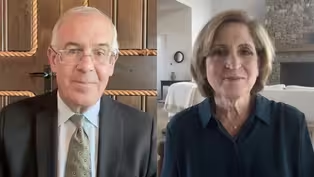
Israeli minister on possible Saudi Arabia diplomatic deal
Clip: 8/18/2023 | 7m 35sVideo has Closed Captions
Israeli minister Ron Dermer discusses potential diplomatic deal with Saudi Arabia
A top-level Israeli delegation is in Washington to discuss the broad outlines of a once-unthinkable agreement between Israel and Saudi Arabia to normalize diplomatic relations. It comes amid an unprecedented civil upheaval in Israel as Netanyahu's government looks to restrain the country's Supreme Court. Nick Schifrin discussed more with Israeli Minister of Strategic Affairs Ron Dermer.
Problems playing video? | Closed Captioning Feedback
Problems playing video? | Closed Captioning Feedback
Major corporate funding for the PBS News Hour is provided by BDO, BNSF, Consumer Cellular, American Cruise Lines, and Raymond James. Funding for the PBS NewsHour Weekend is provided by...

Israeli minister on possible Saudi Arabia diplomatic deal
Clip: 8/18/2023 | 7m 35sVideo has Closed Captions
A top-level Israeli delegation is in Washington to discuss the broad outlines of a once-unthinkable agreement between Israel and Saudi Arabia to normalize diplomatic relations. It comes amid an unprecedented civil upheaval in Israel as Netanyahu's government looks to restrain the country's Supreme Court. Nick Schifrin discussed more with Israeli Minister of Strategic Affairs Ron Dermer.
Problems playing video? | Closed Captioning Feedback
How to Watch PBS News Hour
PBS News Hour is available to stream on pbs.org and the free PBS App, available on iPhone, Apple TV, Android TV, Android smartphones, Amazon Fire TV, Amazon Fire Tablet, Roku, Samsung Smart TV, and Vizio.
Providing Support for PBS.org
Learn Moreabout PBS online sponsorshipGEOFF BENNETT: A top-level Israeli delegation is here in Washington this week to discuss the broad outlines of a once-unthinkable agreement between Israel and the kingdom of Saudi Arabia to normalize diplomatic relations.
Nick Schifrin explains.
NICK SCHIFRIN: (AUDIO GAP) several agreements shepherded by the Trump administration between Israel and its former adversaries comes now the prospect of the biggest prize, but at what price Israel, the United States and Saudi Arabia?
At the same time, unprecedented civil upheaval grips Israel, as Benjamin Netanyahu's government looks to restrain the country's Supreme Court in what his critics say could destroy the nature of Israeli democracy.
With me now to discuss this and more is the Israeli minister of strategic affairs, Ron Dermer.
Ambassador Dermer, thanks very much.
Welcome to the "NewsHour."
As I said, among the topics that you are here in Washington to discuss is the possible normalization between Israel and Saudi Arabia, which U.S. officials tell me they are prioritizing, hoping... RON DERMER, Israeli Minister for Strategic Affairs: Correct.
NICK SCHIFRIN: ... in the next year.
And part of that would be allowing Saudi Arabia to have civil nuclear capacity, including enrichment.
Does the Israeli government support that?
RON DERMER: Like so many things, the devil is in the details, and we're going to have to look at what ultimately is agreed upon.
And you're right.
The Saudis have put that, a civilian nuclear program, which you probably are aware of, they -- as the signatories of the NPT, they could go to China or they can go to France tomorrow, and they could set up -- ask them to set up a civil nuclear program and to allow for domestic enrichment.
They could do that tomorrow if they wanted to.
So the question that I asked myself is, if the U.S. is involved in this, what will that mean 10 years down the road, 20 years down the road, 30 years down the road, and what's the alternative?
There are other issues the Saudis have put forward.
(CROSSTALK) NICK SCHIFRIN: Sure.
Sure.
And -- but it sounds like you're not against it, certainly.
And that is not necessarily the policy of the Israeli government over the last few decades.
There's been a long tradition opposing nuclear expansion in the region.
It used to be known as the Begin Doctrine, after Menachem Begin, of course, former prime minister, founder of Likud Party, who, of course, Prime Minister Benjamin Netanyahu is a member of.
Begin bombed an Iraqi nuclear reactor to prove his doctrine.
RON DERMER: Right.
NICK SCHIFRIN: Does this Israeli government believe the Begin Doctrine no longer applies?
RON DERMER: No, the Begin Doctrine definitely applies.
You have countries in the region that can have civilian nuclear power.
That's a different story than a nuclear weapons program.
NICK SCHIFRIN: You're also, of course, asking for something.
The prime minister's former national security adviser Meir Ben-Shabbat said this: "Saudi Arabia joining the nuclear club would produce a widening of nuclear proliferation in the region.
Other countries would work to acquire uranium enrichment capabilities in their own territory."
So what does Israel want in exchange for that?
RON DERMER: We're not going to agree to any nuclear weapons program with any of our neighbors.
And the question will be, when it comes to the details of an agreement, what are the safeguards?
And what happens if they take another path, if they take a path with the Chinese or something else?
We have to think through that whole thing.
But let's not underestimate the impact that an Israeli-Saudi peace agreement could have on the region and the world.
I think, if Saudi -- if you get a Saudi-Israeli peace, you're going to have several other Arab countries, and Muslim countries are going to follow.
And I think it's the ultimate game-changer.
(CROSSTALK) NICK SCHIFRIN: But we also have to deal with the Palestinians.
Of course, Saudi Arabia will demand significant concessions from Israel when it comes to the Palestinians.
Let me give you some options, ending illegal settlement activity, curbing especially large settlements, strengthening the Palestinian Authority, and expanding the territory under its jurisdiction.
Are you willing to give any or all of that to the Saudis... (CROSSTALK) RON DERMER: Well, this may surprise you, but I'm actually not going to negotiate on PBS.
What we will do -- I will say the way, we look at this issue, it's not just this is that -- this or that price for Israel.
We would like to ultimately achieve a peace agreement with our Palestinian neighbors.
NICK SCHIFRIN: Saudis are making clear there's no peace with Saudi Arabia until there are these concessions for the Palestinians.
Are you willing to... (CROSSTALK) RON DERMER: Well, I don't think -- I don't think they have been specific about what concessions.
I think... NICK SCHIFRIN: They haven't, which is why I gave you some options.
RON DERMER: And I think -- and I think what Saudi Arabia looks at this move with the United States as something that will anchor their alliances with America for a half-century.
And I think we both have an interest in seeing if we can get the Palestinians on a path which can ultimately lead to a political settlement of the conflict.
NICK SCHIFRIN: Let's talk about judicial reform.
These are efforts the prime minister describes as reforms to Israel's -- quote - - "all-powerful judiciary."
RON DERMER: Right.
NICK SCHIFRIN: You represent the government coalition that's negotiating with the opposition in the president's house in Israel.
In the United States, as you know well, if the House of Representatives by a small majority wants to abuse the rights of the minority, it would pass a law that goes through the House, through the Senate, signed by the president of the United States, goes through the federal court system, the Supreme Court, as guaranteed by the Constitution.
In Israel, if the Knesset, if the Parliament wants to impose its majority on the minority, there's only one check, the Israeli Supreme Court.
Why are you trying to remove that check?
RON DERMER: Well, we're not trying to move the check.
I think there's been a lot of misreporting on that.
There are many checks that the Supreme Court has on the authority of the executive branch and even on the Knesset.
When a law is passed, they can decide whether the laws is - - there's a conflict of interest, whether there was due process, whether it's proportionate, all these other checks.
But there was an extra check that you don't have in your system here, which is, the judges could decide, we don't believe this is reasonable.
In Israel, you cannot replace the will of the public, elected through their elected representatives, with 50 non-elected judges to decide that this is reasonable or unreasonable.
NICK SCHIFRIN: Since you have been pushing this through, there's obviously been massive, unprecedented protests across the country.
The shekel has lost value.
Private capital inflows are down.
Israel start-ups are registering abroad.
Moody's, S&P have warned about investing in Israel.
And, of course, the military in Israel have repeatedly warned there is a crisis of readiness because of the fissures that your reforms have created in society and because reservists are now threatening not to show up.
So is that not a failure of leadership by Prime Minister Netanyahu?
RON DERMER: No, I don't think so.
I think, unfortunately, some of these protesters have crossed lines that should never be crossed.
We're a citizens army in Israel.
The army should have never been brought into it.
And I... NICK SCHIFRIN: Wait a minute.
Wait.
Are you criticizing individual members for protesting at all?
Is that what... (CROSSTALK) RON DERMER: I don't -- no, of course not.
The protest is a fundamental right in every democracy.
What I don't think you should do, military reservists should not come to an elected government and say, if you don't adopt this or that policy, we're not going to serve democracy.
NICK SCHIFRIN: But you have Israeli military leaders warning the prime minister that this is a readiness issue.
That's more than just the question of individual reservists.
(CROSSTALK) RON DERMER: Because the military reservists have decided that they're going to dictate the policy.
(CROSSTALK) NICK SCHIFRIN: And the leader -- and the military leaders have said there's a significant risk to this.
RON DERMER: But the people who make decisions in a democracy are not military reservists or military officials.
It's the elected branch of government.
And it's the -- that's Israel's democratic leaders that have to make that decision.
NICK SCHIFRIN: And for the first time in its history, next month, the entire 15-judge Israeli Supreme Court will hear an appeal against the law that curbs its own powers.
Will you respect their decision?
RON DERMER: Israel is a country of the rule of law.
So we will always abide by law.
But it's important to understand... NICK SCHIFRIN: Is that a yes?
RON DERMER: It's important to understand that the judges cannot be above the law.
What's the authority?
What's the authority that gives the power of the Supreme Court to decide to nullify a basic law?
It's never happened in Israel's history.
NICK SCHIFRIN: That's correct.
It's never happened.
It's also never happened that the Supreme Court has to hear a case about curbing its own power.
So, again, will you abide by the court?
RON DERMER: Right.
I don't -- and... (CROSSTALK) NICK SCHIFRIN: Will you abide by the court ruling?
RON DERMER: The prime minister put out two principles.
He said the government should always respect decisions of the Supreme Court, and the Supreme Court should never be above the law.
NICK SCHIFRIN: Ambassador Ron Dermer, thank you very much.
RON DERMER: Thank you.
Brooks and Marcus on Trump's Georgia indictment, GOP debate
Video has Closed Captions
Clip: 8/18/2023 | 8m 16s | Brooks and Marcus on Trump's Georgia indictment and upcoming GOP debate (8m 16s)
Comedian Atsuko Okatsuka on her journey to the stage
Video has Closed Captions
Clip: 8/18/2023 | 7m 33s | Comedian Atsuko Okatsuka on her journey to the stage and connecting with audiences (7m 33s)
Japan, South Korea agree to strengthen military coordination
Video has Closed Captions
Clip: 8/18/2023 | 6m 59s | Biden reaches deal with Japan and South Korea to strengthen military coordination (6m 59s)
Residents flee Yellowknife as wildfire moves closer to city
Video has Closed Captions
Clip: 8/18/2023 | 2m 35s | Residents flee Yellowknife, Canada as wildfire moves closer to city (2m 35s)
Trump conspiracies inspire threats against civil servants
Video has Closed Captions
Clip: 8/18/2023 | 7m 19s | Trump conspiracies inspire threats against judges, jurors and election workers (7m 19s)
Providing Support for PBS.org
Learn Moreabout PBS online sponsorship
- News and Public Affairs

FRONTLINE is investigative journalism that questions, explains and changes our world.

- News and Public Affairs

Amanpour and Company features conversations with leaders and decision makers.












Support for PBS provided by:
Major corporate funding for the PBS News Hour is provided by BDO, BNSF, Consumer Cellular, American Cruise Lines, and Raymond James. Funding for the PBS NewsHour Weekend is provided by...




